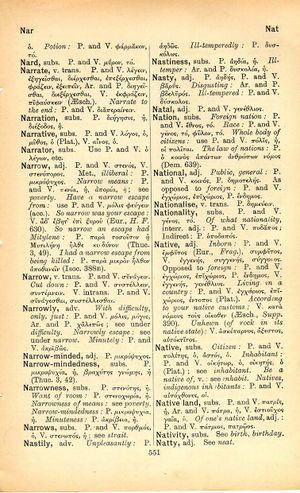narrative: Difference between revisions
From LSJ
m (Text replacement - "(|thumb)\n(\|link=)" to "$1$2") |
m (Woodhouse1 replacement) |
||
| Line 1: | Line 1: | ||
{{Woodhouse1 | {{Woodhouse1 | ||
|Text=[[File:woodhouse_551.jpg|thumb|link={{filepath:woodhouse_551.jpg}}]] | |Text=[[File:woodhouse_551.jpg|thumb|link={{filepath:woodhouse_551.jpg}}]] | ||
P. and V. [[λόγος]], ὁ, [[μῦθος]], ὁ ( | ===substantive=== | ||
[[prose|P.]] and [[verse|V.]] [[λόγος]], ὁ, [[μῦθος]], ὁ ([[Plato]]), [[verse|V.]] [[αἶνος]], ὁ. | |||
}} | }} | ||
{{Lewis | {{Lewis | ||
Revision as of 09:19, 20 May 2020
English > Greek (Woodhouse)
substantive
P. and V. λόγος, ὁ, μῦθος, ὁ (Plato), V. αἶνος, ὁ.
Latin > English (Lewis & Short)
narrātīvē: adv. narro,
I in the way of narration, Don. ad Ter. argum. And.
Latin > French (Gaffiot 2016)
narrātīvē (narrativus), en racontant, au moyen d’un récit : Don. Andr. Arg.
Latin > German (Georges)
nārrātīvē, Adv. (narrativus), erzählend, Donat. ad Ter. argum. Andr. vol. 1. p. 4, 29 ed. Klotz.

